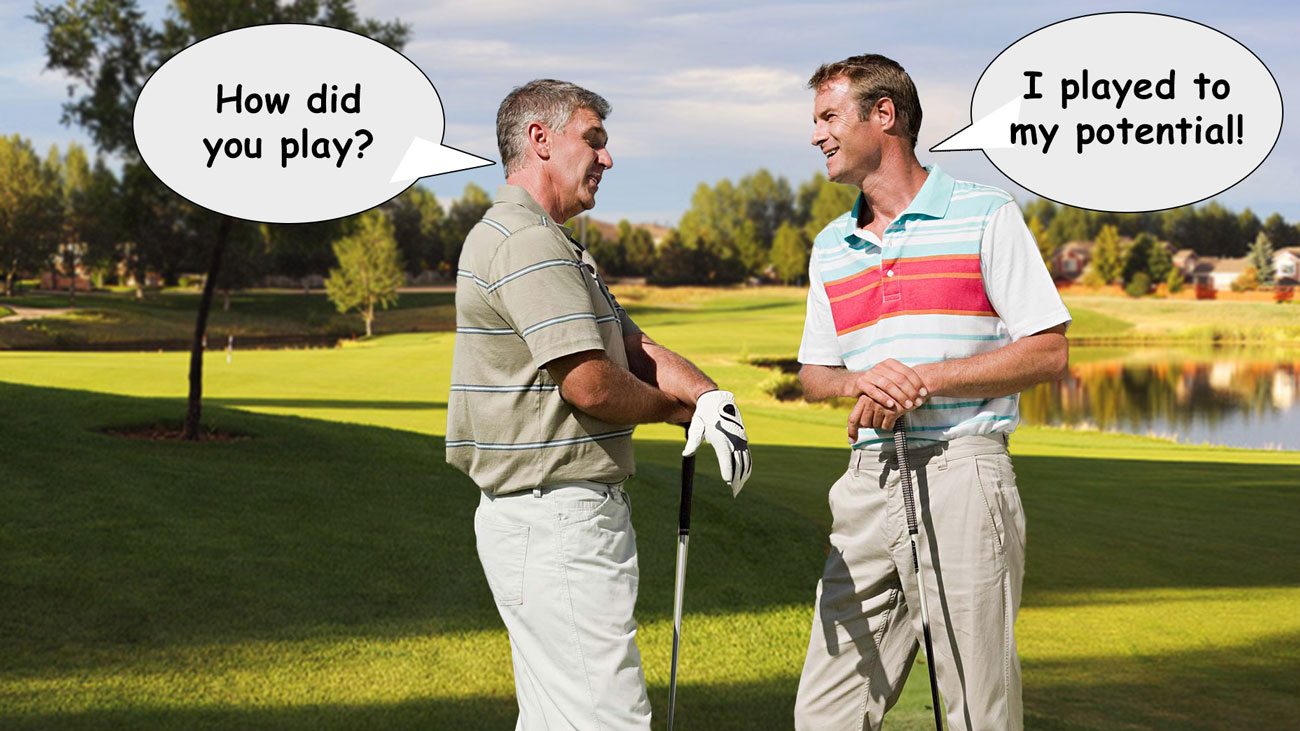By Ed Mate
I once made the mistake of asking my Great Aunt Essie how she was feeling. “Oh, Eddie,” she said. “Never ask an old lady how she is feeling. She just might tell you!”
The same could be said of golfers. Never ask a golfer how they played. They just might tell you!
Throughout my career with the Colorado Golf Association, I have spent a lot of time in the scoring area of golf tournaments. Call it one of the hazards of the job. Asking golfers how they played is only polite. However, most golfers fail to recognize that the answer to this question is simple. Instead they launch into a hole-by-hole summary that would even bore Herbert Warren Wind. Sorry folks, the only person who cares about the details of your round is you! The only possible exceptions are your caddie and your significant other—and in those cases, it’s only to know the extent to which it will change dinner plans.
The “how did you play” dilemma is not limited to tournament golf. There is something about this silly game that makes us want to share every detail of our rounds with just about anyone willing to listen. Somehow, we believe that the amazing things that happened during our latest round haven’t happened to any other golfer since Old Tom was knee-high to a flagstick. Certainly, others want to hear about our club selection on 14…don’t they? I’ll answer your question with another—have you ever uttered the words, “tell me more” when listening to a golfer recount their round?
To spare one another a lot of needless head nodding, “oh reallys,” and insincere “wows,” I challenge you to join me in taking the “Potential Pledge.” By taking this pledge you vow that you will only give one of three answers when asked “how did you play?”
But first, some important background. If you are reading this, you are most likely a member of the Colorado Golf Association. As such, you have an official World Handicap System Handicap Index that has been scientifically calculated to determine your golfing potential. That number represents what you are capable of shooting when you play your best, not what an average or below-average round might look like. To arrive at this prediction, you will notice that the only scores used to calculate your handicap (the ones with an asterisk by them) are the eight best scores among your most recent 20. And remember, by “best,” we mean the scores with the lowest “differentials.” Your lowest eight differentials may or may not be the lowest actual scores, but rather the best scores when compared to course difficulty. In other words, an 80 on a difficult course with a high Course and Slope rating may be a better score than a 79 on an easier course.
Okay, so now that we have a scientific, purely objective measure of our potential, we have a very simple, succinct, and accurate way to respond to the “how did you play” question. The answers are: 1) I didn’t play to my potential; 2) I played to my potential; or 3) I exceeded my potential. How do you know how to answer? Simple. When you post your score on the GHIN app it immediately calculates a differential. If the differential is equal to, or lower than the highest differential being counted toward your handicap (the scores with the asterisks by them), I would say you played to your potential. Congratulations! This only happens about 20 percent of the time, so you should buy drinks for your foursome. If the differential is three or more shots above your handicap index, you didn’t play to your potential. Join the club. This is golf after all, and most of the time we don’t achieve our goal. Hopefully, you had that one good shot during the round that will bring you back.
This brings us to the third and final answer, exceeding your potential. Okay, now we’re venturing into some dangerous waters. There are three possible reasons you exceeded your potential: 1) You played exceptionally well. The putts were dropping, the bounces went your way—it was one of those rare rounds where the golfing gods smiled down upon you. 2) You just had a golf lesson, and everything clicked. That swing thought was working, and you are truly on the cusp of a major breakthrough that is a sign of good things to come. Or 3) You are a sandbagger. If this is the case, you will find yourself exceeding your potential more often than is statistically probable. I don’t know how you do it, but I would suggest you quietly collect your winnings and sneak out of the back exit.
So, the next time you are asked, “how did you play” remember the “Potential Pledge” and give one of these three simple answers. If we all do this, think about how much more time we will have to talk about other, more important things. You know, things like religion and politics for instance.
Hmm…now that I think about it, tell me more about that birdie you made on 15!







